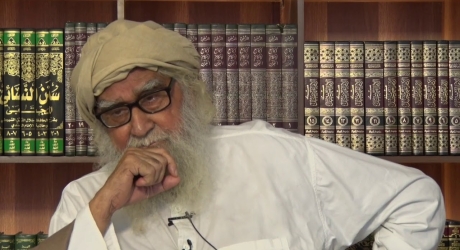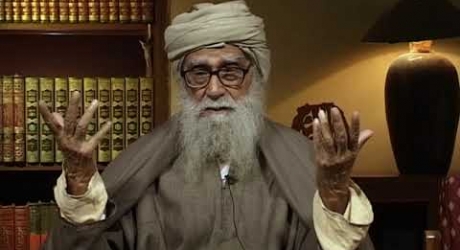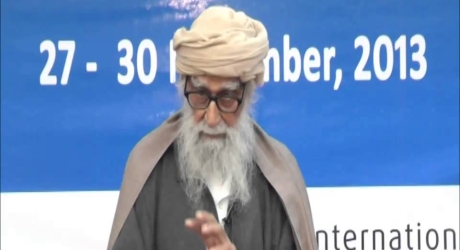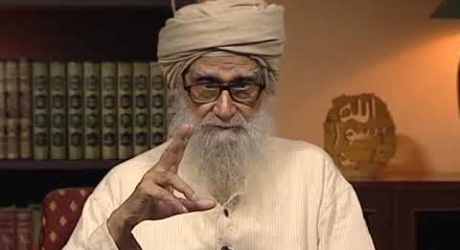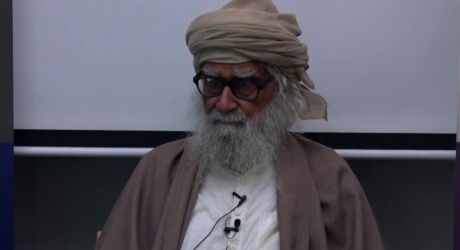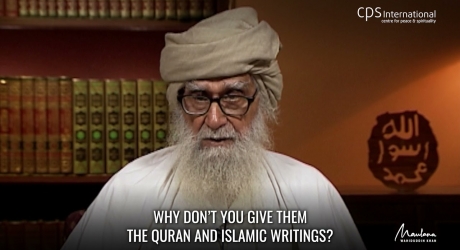The history of the Muslim ummah is now in the 21st century. Now, the time has come for the entire Muslim community to change its mindset and ‘turn all together towards God in repentance’ as mentioned in the Quran. They must change their internal approach. This is the only solution to the problems of the Muslim ummah. There is no other possible or desirable solution. The circumstances produced over the last few centuries have resulted in a negative mindset amongst all the Muslims of the world. As a result, Muslims have forgotten their position, that they are dayees of God’s religion, while the position of all other peoples is that of madu.
In reality, the relation between Muslims and others is that of dayee and madu. But owing to the negative mentality of Muslims, this relationship turned into one of rivalry and enmity. The most urgent task to be done today is to improve the relationship between Muslims and others.
A new mindset must be inculcated among Muslims as a group that they are the dayees and all the others are madus. It is only in this realization that Muslims will find success both in this world as well as in the Hereafter.
Introduction
A person who volunteers to spread the message of God must possess certain attributes. Foremost, he must consider all human beings as his madu, not strangers or enemies. Most unfortunately, the present-day Muslims have become bereft of this very attribute. They consider the rest of the world as rivals and conspirators. Those who have such a mindset can never do true dawah work. They tend to brand their non-dawah activities as ‘dawah work’. A verse in the Quran describes such people as
They love to be praised for what they have not done (3:188)
Here I would like to present an analogy. The customer-friendly nature of a businessman for instance, allows him to see a potential customer in every person he comes across. The same holds true for a dayee. His being a dayee itself is contentious if the believer does not possess madu-friendly behaviour. The Prophet Muhammad began his dawah mission in Mecca in 610 AD. At that time, many tribes resided in Mecca most of whom were idol worshippers but he was focussed on propagating the word of God,
O men! Say, there is no god but One God and you will be successful (Seerat Ibn Hisham)
The Prophet never used words like Kafir or Mushrik to address the residents of Mecca. This was because he considered everyone as a human being. Contrary to the prophetic teachings, the present-day Muslims succumb to negative emotions instantly. Such notions are a clear digression from the path of God.
During the seventh century AD, the equation between Muslims and non-Muslims was that of dayee and madu. But post the introduction of jurisprudence during the Abbasid period, terms like Darul Islam and Darul harb came into existence. Even though neither the Quran nor the Hadith discriminate between human beings, the jurists led the community into this fallacy and changed the very equation of dayee and madu. An eminent faqih (jurist) said,
is ummat ka aakhir usi se durust hoga jisse iska awwal durust hua tha (The end [portion] of this community will be remedied by that [action] which remedied its beginning [portion])
In other words, the present-day Muslims will have to revert to the Prophetic times. Only then will they become the well-wishers of other men and develop human-friendly behaviour.
How did the division take place?
Dawah work does not seek announcement. It is an act of well-wishing like a father would for his son. But if the heart that loves the son, harbours hatred for others, such a person is clearly not a dayee but a liar. Well-wishing is the essence of dawah work and is serves as the starting point for a dayee. In the words of the Prophet Muhammad, a true dayee must live by the following
All men are brothers and sisters (Abu Dawud)
Dawah work marked the beginning of Islam. Later, when Muslim empires came into existence, the dayee-madu equation changed to ruler-ruled. The Muslims developed a superiority complex on account of their empires and during this period, the jurists introduced such false terms that became killers of dawah spirit. They failed to understand that introducing a term and creating a divide was not the solution, they were required to pray. The degeneration grew so intense over a period of time that people started justifying usage of terms like ‘Kafir’ by referring to the following verse of the Quran
Say, ‘You who deny the Truth..’ (109:1)
It is totally false to cite this reference to justify the usage of the term. There is a clear example in the Prophet Muhammad, who never addressed his contemporaries as ‘Kafirs (deniers of truth)’. The above verse was a revelation from God after innumerable efforts had been made to transmit the message of God and the deniers remained persistent in their denial. However, no human being has the right to use this term. Unfortunately, the books written after the Abbasid period completely dispensed with the concept of dawah work and remained engrossed in these futile arguments.
I would cite here an instance that features in Al Bukhari (book of Hadith) and which teaches the believers to give mutual respect and be tolerant. One day a funeral procession was passing along a street in Medina. The Prophet, who was seated there at the time of its passing, stood up in respect to the deceased person. One of his companions said, ‘O Prophet, it was a funeral procession of a Jew!’ meaning that he should not demonstrate such respect for a non-Muslim. The Prophet replied: ‘Alaisat nafsan’: ‘Was he not a human being?’ This ‘humanitarian’ outlook was typical of the Prophet’s vision of life. He was able to see everyone basically as a human being. Just as God had created him, so also had God created the Jew. People may have their differences in belief, religion, culture, etc., but a common bond has to be discovered between them, which shows them all to be human beings.
When did the derailment of thought occur?
As the degeneration and consequent misinterpretation grew among the Muslims, those verses of the Quran which were related to dawah work were ascribed to war (Qital). A verse in the Quran says,
God has bought from the believers their lives and their wealth in return for the Garden (9:111)
This verse for instance is used by perpetrators of violence to justify their actions but to relate it to qital is a severe misinterpretation. Qital is a temporary teaching of Islam, allowed only in case of defense. At the time of the Prophet Muhammad, religious persecution was rampant. Religious freedom was unheard of and those who believed in One God were mercilessly persecuted. Therefore the Prophet Muhammad received special divine succour in the form of a powerful team consisting of more than one hundred thousand individuals. Equipped with this team, the Prophet ended this coercive system of religious persecution, and it was in Arabia that it was first of all overthrown. Then within a very short span of time, they advanced to abolish the coercive system established by the Sassanid and Byzantine empires. However, this operation was certainly only temporary in nature. Its goal was to put an end to the age of religious persecution and usher in the age of religious freedom. This end was fully achieved during the early period of Islam, the age of the Caliphate. Afterwards the time came to keep the sword in its sheath and engage in da‘wah work, that is, the call to God, which was the real and permanent goal of Islam. Qital was only an age factor; the above verse has a reference to dawah work only; qital is not the intent of the verse. In fact jurists unanimously opine that Qital is not has-saan liz-zay-tihi (good for its own sake), rather it is has-saan li-ghair-ihi (good for the outcomes it produces). According to the explicit command of the Qur’an, the call to God is the true and eternal mission of Islam, whereas war is only temporary and allowed only in exceptional cases.
In the present world, religious intolerance has been replaced with complete religious freedom. Today under auspices of the United Nations all the nations of the world have signed the universal declaration of human rights. In accordance with this declaration, religious freedom has been accepted as the natural birthright of all human beings. As opposed to practices in ancient times, no one now enjoys the right to persecute anyone on the basis of religion. This is the change, which has confined the sphere of religious difference to peaceful negotiation.
Therefore, the Qital is not applicable in the modern-day scenario, only peaceful dawah work is. Muslims, now, have no justification to perpetrate violence in the name of Islam. In fact, it is worth noting that the violence in which Muslims are engaged worldwide is for the purpose of achieving land or property only. Islam does not sanction such violence. Islam aims at inculcating faith in One God and leading of a God-oriented life while doing peaceful dawah work. By indulging in violence, the present-day Muslims have paved way for enmity between themselves and other communities. This in effect eliminated the most determinant attribute of a dayee – to be the well-wisher of others. According to the Quran, the Prophet said,
I am your sincere and honest adviser (7:68)
Contrary to this teaching of the Quran, indulging in violence fosters hatred and negative feelings for other communities. This is what the present-day Muslims have succumbed to and this has made them devoid of the sense of well-wishing. The action, therefore, which takes away the temperament of well-wishing and consequently, the spirit of doing dawah work, is absolutely unislamic.
What must the present-day Muslims do?
The present-day Muslims will have to unilaterally finish all acts of violence and dedicate themselves towards becoming peaceful members of the society. This was exemplified by the Prophet Muhammad at the instance of Hudaybiyyah Peace Treaty. When the Prophet Muhammad migrated from Mecca to Medina, the Meccan leaders, still not content, launched an all-out offensive against him. Several military engagements ensued without their being a decisive victory in sight. Ultimately, the Prophet entered into a pact with the Meccans at Hudaybiyyah. This, in effect, was a 10-year peace treaty which permitted the Prophet to change the arena of action and to look forward to a long and undisturbed period of dawah work. Till then, the meeting ground between Muslims and non-Muslims had been the battlefield. Now the area of conflict became that of ideological debate. Very soon after this agreement was signed, the one-time enemies began interacting with each other on a large scale. During this period of interaction, the ideology of monotheism so asserted itself that large numbers of their former enemies began to enter the fold of Islam. But to restore normal relationship between the dayee and the madu, the Prophet had to unilaterally agree to all conditions laid down by the other party. So much that at the time of signing the Treaty, the word ‘Prophet’ which was his very identity had to be struck off from the document.
Despite being oppressive and humiliating, the terms of the Treaty failed to deter the Prophet’s resolve of going ahead with it. In doing so, the Prophet established the example that violence must be put to an end at all costs and the dawah atmosphere must be restored between the dayee and the madu.
Therefore I often say that what Muslims do is not Islam. Islam is only that which is told in the Quran and the Hadith. A scholar said, every religion begins as an ideology but after sometime it is reduced to a culture. Same is the case with Islam. It began as an ideology but as generations elapsed, it became a culture. Present-day Muslims follow only a culture; they must revert to Islam. They must pay any price, whatsoever, to establish normalcy between dayee and madu or else their paradise will become doubtful. Unless the Muslims leave the confrontations they are indulged in, they will never be able to return to the right path because the only condition for being a Muslim is to do dawah work. A verse in the Quran addresses the Muslims thus,
We have made you a middle nation, so that you may act as witnesses for mankind (2:143)
The above verse is often interpreted to mean that the Muslims are the ‘best’ community. This is totally wrong. The term ‘middle’ nation denotes the ‘intermediary’ status of the Muslims. This is the law ordained by God. On one side is God and on the other side are his creatures. The Quran says that the role of intermediary (wasat) is to take from the Prophet and pass it to people. Muslims therefore are a middle nation between the Prophet and the rest of the mankind. This is the real position of the Muslims and if they do not do so, there being a believer is doubtful.
Towards the end
These days, a lot of people do dawah work amongst the downtrodden. I used to often think why they do so, because the Prophets did dawah work amongst the intellectual leaders of times – the mala-e-qaum. I realised it was so because being inadequately prepared rendered the Muslims unfit to access the real madu. It is important to understand that unless the message reaches the opinion makers of the times, dawah has not taken place because primarily, the message must be transmitted to the intelligentia and through them it percolates to all.
The Muslims lagged behind because being filled with anti-British sentiments, they refrained themselves from receiving modern education and because of being inadequately prepared to face the modern world, they could not get the best of jobs. The Muslims must re-assess themselves and plan from the start. They will have to admit that ‘We were wrong’ because unless they accept their mistake, they cannot surge ahead on the right path. This matter becomes very serious because our death is connected to our life and very soon all of us shall be standing before God and He shall question each believer about how much of his duty did he discharge. Referring to those who do dawah work, a verse in the Quran says
Believers, be God’s helpers (61:14)
The explanation of this verse is found in another verse of the Quran
So that mankind would have no excuse before God (4:165)
Calling people to God means warning man of the evil consequences of leading a self-oriented life, and therefore, inviting him to adopt God-oriented life. Dawah, which in the Quran is called ‘warning and giving glad tidings’, is directly the mission of God so that men might have no argument with God. That is why God wants this divine work to be performed only by human beings. When all men stand before God and if some get up before God and say that ‘We did not know about Your Creation Plan, What are you punishing us for – for our ignorance?’ God desires that no one can question God such. This is why God sent messengers and created a middle nation so that this work of God goes on unhindered and no one can say that we were ignorant. Dawah work is not to increase population but so that truth enters the hearts of men and they get to know the way to paradise. So that they get to know about hell and what awaits them in the hereafter. While the work is done in this world, it concerns the afterlife. This work can be done only by crushing the communal sentiments. The message of God must assume prime importance because communal sentiments are not the concern of God. Man will have to back track on that front. Even if others create trouble, positivity will have to be maintained. Muslims should therefore, shun all negative media and writings because unless they do so, they will not be able to become positive about the madu. Instead of madu-friendly, these negative writings cultivate madu-unfriendly behaviour. It is a serious issue which requires much forethought because man is on Earth for a short duration and this work must be done before time runs out.





